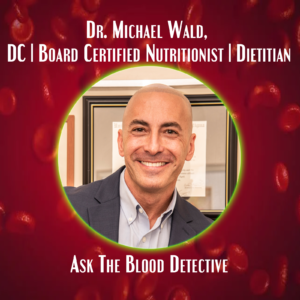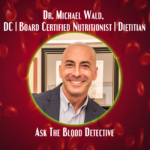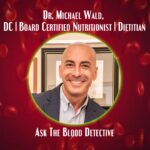Cancer & Nutrition – What you should know
Cancer & Nutrition – What you should know
Traditional cancer treatments consist of radiation, surgery and chemotherapy. Natural treatments usually consist of dietary and nutritional supplement approaches including enzymes, fatty acids, herbs and more.
Hyperbaric therapy, sauna and various other methods also exist. Oncologists, and medical doctors overall, have little or no training and this partially accounts for why cancer therapy recommendations today almost never include nutrition. This is a big mistake! Here’s why…
Cancer is a complex and changing disease that often occurs in individuals with comorbid conditions requiring personalized nutritional efforts. There is no “cancer diet”. There is no single nutritional supplement that will “cure” cancer. According to Dr. Wald, “I have have seen many people over my 30-plus yr career insist on social media and face-to-face, that they cured their cancer naturally and nutritionally. However, when I press them

for proof it NEVER comes. I have even offeredcash for proof. One time a person claiming to have their cancer cured on a Facebook Cancer page did offer proof after I pressed him. What he sent me was a link to another website of a person who made the same unsubstantiated claims. I was astounded and awakened by the fact that most lay-people have no concept of what real evidence is and this can, and often does, lead to premature death of the individual and much suffering. But there is much to do about most cancers that can make the difference between quality of life, and sometimes a longer life.
What you CAN do about cancer with nutrition!
First, seek out the professional advice of a certified or licensed nutritionist that has experience with actual cancer patients. Matching the nutritional needs of cancer patients to the best herbs, vitamins, minerals, proteins, enzymes, fatty acids or phytonutrients, requires years of experience, laboratory technologies (testing) and common sense among other skills.
Second, get a test of your absorption
There are various tests available that can help determine if the person with cancer is malabsorption, and they often are. This is essential to know so that the clinical nutritionist can adjust his/her food and nutritional supplement recommendations to the changing needs of the individual with cancer. That’s right! There should be initial nutritional recommendations made by the clinical nutritionist that are expected to change often as the condition and overall progress of the person with cancer changes. This is partly why there is no one diet or set of nutritional products that are correct simply because they should change as the needs of the cancer patient changes.
What types of natural cancer approaches work?
Thirdly, not all natural or for that matter standard cancer care, work equally well for each person. This is for a variety of factors including the extent and type of the cancer, genetic factors, comorbid condition and other considerations. This is why if natural approaches are to be used by an individual with cancer care must be taken to avoid adverse drug-nutrition interactions as well as favorable drug-nutrition interactions.
Vitamin Testing – not as accurate as you might think!
Forth, most vitamin tests do not reveal long term nutritional deficiencies. Sometimes it is necessary to perform functional nutritional tests (i.e., vitamin c flush test, zinc taste test, probiotic and enzyme challenge tests, etc.). For example, an elevated vitamin B12 serum level tells us nothing about the status of B12 within the cell (as the plasma is around or “out of the cell”. The size of the red blood cell is usually enlarged in B12 deficiency and also in folic acid, vitamin E, vitamin C and vitamin B1 deficiency (when other non-nutritional causes of this finding are eliminated).
Fifth, when evaluating whether or not your choice(s) of natural care or combination of natural and standard cancer therapies work, you must have some goals in mind such as:
- Performing various nutritional tests and ensuring that any abnormal findings are corrected.
- Your choices of natural and nutritional products must not adversely affect your choice of standard therapies such as chemotherapy and radiation.
- You should not attempt to manage your nutritional care on your own!
- This is because the science and art of nutritional care takes years to learn and it is easy for the layperson to get it wrong.
- For example, intravenous vitamin C may help kill cancer cells, but the dose and administration of the IV-vitamin C must be based on the fact that pre and post vitamin C testing is performed before and after an IV-vitamin C drip to determine how the individual uses vitamin C – and then the amount or dose of the vitamin C is determined correctly.
- Also, vitamin C does not work as an antioxidant, but as an oxidant – and this means that the practitioner providing the IV-vitamin C must perform many tests before using nutrition such as the G6PT (glucose 6-phosphate dehydrogenase enzyme); if a patient has a positive test (deficiency of G6PD), then the IV-C could be lethal to the recipient or harmful at the least as red blood cells tend to “explode” when exposed to high levels of IV-C.
- Your dietary choices during cancer depend upon too many factors to review in this short article but include, your weight, your percentage of muscle, water and fat and your metabolic rate – as these factors determine dosages of your nutritional supplements and amounts of proteins, healthy carbs and fats that compose your diet.
- All medications must be checked for adverse and favorable effects when used with nutritional supplements.
- Importantly, the most common cause of death in cancer patients is infection and or malnutrition. Malnutrition increases infection risk and it is know that optimizing the nutritional status of a cancer patient can reduce the risk of infection and potentially enhance quality and length of life.
- Those with cancer often have acid base or acid alkaline problems. It is UNTRUE that cancer patients can have acidic blood and it is also untrue that one can make themselves ALKALINE. The truth is that we want to be alkaline in our mouths, acid in our stomachs, slightly alkaline in our small intestines and urine and be have a pH of about 7.4 in the blood (hardly acid or alkaline). See Dr. Wald’s radio show, pH Lies.
As one can see, the use of nutrition in cancer care is not to be taken lightly; after all, your life or the life of someone that you love may depend upon getting it right.
 Previous Post
Previous Post Next Post
Next Post